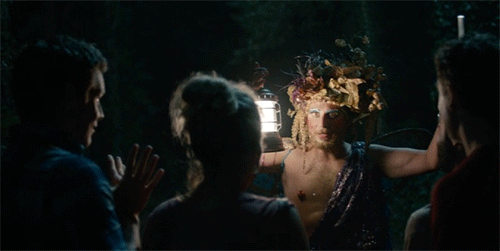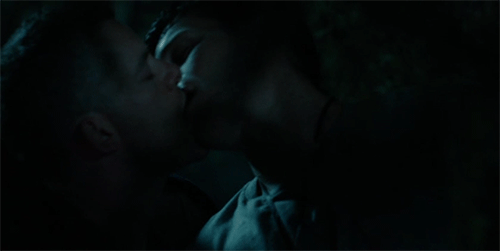Looking began its sophomore season on HBO last night, and the first episode is a rollicking, sexy good time set amongst the redwoods. But having watched five of the new episodes, I'll just say I have a couple of concerns about how this season looks overall.
Fans and critics alike acknowledge that Looking doesn't keep pace with most of the TV universe and the creators and stars of the show had to repeatedly give interviews last year where they said they wished people would stop comparing it to Girls, which is a tough thing to ask given that the shows air back to back on the same network. It's a beautifully shot, arguably groundbreaking show about modern urban gay men in their thirties that established in its first season that it was not going to conform to any television tropes, at least the sort of clichés of structure and speed that you expect from a half-hour comedy also, it's not really a comedy, but I'll get back to that. Having now watched the first half of the new season via a screener sent by HBO, I can say that all that stuff remains the same: Doris (Lauren Weedman) is still the funniest and best part of the show, and while some of the writing is a little punchier and the sex stuff a bit more graphic, I am still frustrated by the fact that so little ever gets accomplished, plot-wise, in a single episode.
Episode One kicks off with the core trio, Patrick (Jonathan Groff), Dom (Murray Bartlett), and Augustin (Frankie J. Alvarez) on a road trip out of San Francisco to the popular gay destination of the Russian River and Guerneville. While we don't get to see any of the town itself, we do get to see redwoods, the river, and some nude frolicking on "Bear Beach" (which is not a real place), and the inside of a pretty prototypical gay man's cabin from the back in the day, which is supposed to be the longtime escape of Scott Bakula's character Lynn and his deceased boyfriend. Lynn lent the cabin to Dom for the weekend, and the boys all decide to go take a little time away in the wilderness.
Patrick, being his usual neurotic ninny self, tries to get everyone to stay sober, go on hikes, and play board games something no gay group of friends in the history of the universe, unless everyone was in AA, would tolerate longer than ten minutes. We're led to believe this lasts a full 24 hours until Doris thankfully arrives, by surprise, declaring "everyone died" at the hospital where she's a nurse, therefore she got off work early. She pours herself a mug full of booze and finally gets the party started, joining the gang as they head out to the woods to find a magical party they heard about while canoeing past some bears earlier that day.
This is also how we're introduced to new recurring character Eddie, played by Mean Girls alum Daniel Franzese who's lately been treating us to a lot of fun pop song parodies. Eddie will quickly become Augustin's bear pal and love interest who works at a non-profit outreach organization catering to trans youth, and since he's also HIV-positive, he single-handedly brings to the show three major elements of the LGBT rainbow that had been missing in Season One: bears, poz people, and trans people. Also, Franzese is hilarious and the character of Eddie is written pretty campily (Patrick refers to him in a later episode as "like having your own personal Mrs. Madrigal"), offering a refreshing foil to the always insufferable Augustin, who remains insufferable, but at least he isn't making bad art anymore.

The gang finds the magical party in the woods, called The Promised Land, which is way cooler and better costumed than most any other parties that have happened in the real-life Russian River in the last decade, and they all decide to take some of Augustin's molly together (we're supposed to believe that innocent Patrick, also, tries molly for the first time here despite living in SF for how long??). The party turns out to be one of the better scenes out of both seasons, a rare moment of believable, joyful abandon for these usually hamstrung characters in which we see a vaguely familiar version of Bay Area gay party culture set in a redwood grove.
And Patrick picks the moment when he's most high to call Kevin (Russell Tovey) on his cell and tell him to come another suspension-of-disbelief moment because a) cell service is terrible up there, and b) how the hell did Kevin drive 90 minutes from the city and find this party deep in the woods not near any roads? Anyway, they have sex against a tree, it's pretty hot, and Patrick has a great line after Kevin kisses him, on molly: "Do that again. I could feel it in my toes."
Back in the city, in the upcoming episodes, the pace slows again, and if the writers and director Andrew Haigh seem fond of any tropes, TV-wise, it seems to be the knee-jerk drama of soap operas, using the day-to-day changes of heart of these characters, and their clichéd romantic troubles, as the core drivers of the story without much levity in between. This leads me to the other fundamental oddity about Looking it never seemed to decide if it wanted to be a comedy, and it certainly isn't written as one, even though Doris and now Eddie add some much needed humor amidst all the fretting.
There is a lot of earnestness, and some very good acting, in the scenes between Patrick and Kevin, and those between Dom and Lynn in later episodes, and fans of the show will be eager to see where these storylines lead. But there's no getting around the fact that Haigh's indie-movie pacing, and that of the writers, feels out of sync with modern television, and much better suited to a show that has an hour each week to tell its stories and circle around to each of its core players. Given the constraints of a half hour, and a ten-episode season, I wish HBO had done more to convince them they needed to cover more ground than they do by episode five (which is as far as my screener got). Because, without any spoilers, that's about where I had hoped they would have gotten by the end of Season One. I empathize with the urge to give these characters room to express themselves and evolve in real time, and I sincerely, as I did last season, want to see this show last and watch these characters grow further, and do more fun stuff. But I fear that the audience response may be a lot like it was the first time around, and not unlike a lot of prettily shot indie cinema: mild admiration followed by a snapping of fingers to get to the point already.
The Radical Faerie who guides them to The Promised Land. Gif via OUT


